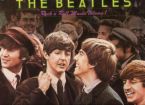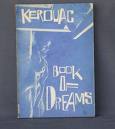Book Review
Orpheus Emerged
by Jack Kerouac

I read in the introduction that Orpheus Emerged was published posthumously by the estate of Jack Kerouac following his death in 1969, but while looking at the copyright information, I see that it was actually published in 2000 by the "Estate of Stella Kerouac", his widow (the last unlucky wife). My feeling is that Kerouac never pushed this book to publication himself, and perhaps not even Stella, because it represents a stage in his writing career that was somewhat sophomoric. It is clear throughout the book that Kerouac has not yet found his "voice", the style of writing that would make him famous, and in some ways had not found his vision of what he was trying to relay to the world. However, even in saying that, even though this is not the Kerouac that defined the Beat Generation, this is still Kerouac, and it is still beautiful.
This work has not the physical descriptions of place, the poetic prose, the long rambling sentences that made Jack famous, but it retains quality of its own. It acts more as a flash photo, as a description of a group of people at one moment in time, that makes a statement about men, women, and relationships during the late 1940s. It captures the essence of Jack as a young man in a process of self-discovery without being utterly personal, as well as the other writers and drifters that would become an important part of his life as the core of the Beats.
One of the reasons I liked this book was precisely part of that core, because part of my interest in the Beat Generation lies in the friendships and literary ties between this group. I find it compelling that this core drew inspiration and effectively immortalized each other in their various writings. This particular book, or rather "novella", was written during the time that Kerouac first fell in with some of these people at Columbia University, and so it is our first look through Jack's eyes at some of these friends. We have "Leo" as a young Allen Ginsberg, questioning the world and humanity, we have Lucien Carr possibly as the character "Micheal", William Burroughs and his wife as "Anthony" and "Marie" -- the gang's all here.
Each of the characters are reflections of the perceptions Kerouac had of his friends during these early formative years, the years of the "New Vision" literary line, and his perceptions are with the soft glow of early infatuation and the excitement of new ideas, of sharp college minds before becoming jaded and edged with the disappointment of life, the "tired and down and out" version of beat. This early stage of the Beat Generation captured in this book is more true to Kerouac's original meaning of the term "beat", as in "beatific", as in a quest for a deeper spiritual understanding, as illustrated by the discussion of poetry written by Michael, which Leo and Paul criticize but secretly long to understand, poetry speaking of the transcendent path towards a greater connection with the Divine.
My overall impression when finishing the novel was "oh, this one might be my favorite yet," but I say that after putting down each one of his books, and I know that ultimately it would not replace The Town and The City as representative of what I love about Kerouac's writing. The Town and the City ties Jack the intellectual with Jack the hipster, the wide eyed youth looking at postwar America in all its gritty and sublime detail, all the while tying it to the universal and conversely individual experience of visceral life, in words of poetic prose.


























No comments:
Post a Comment